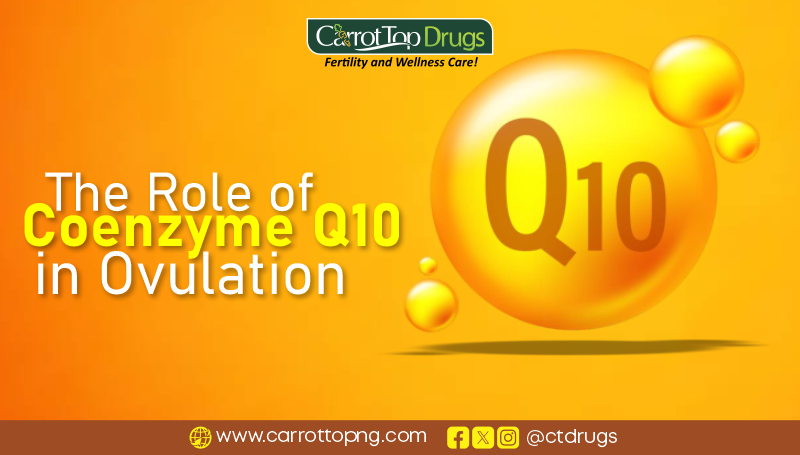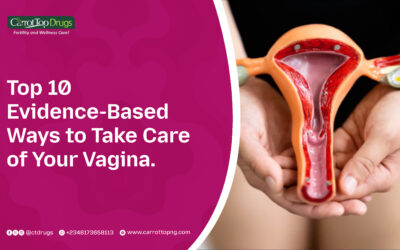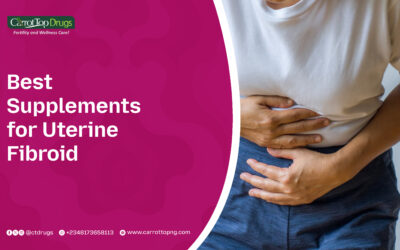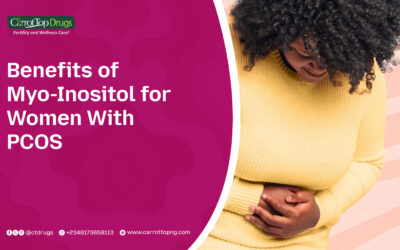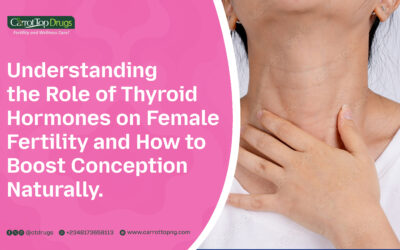Introduction
Coenzyme Q10, commonly referred to as CoQ10, plays a crucial role in various physiological processes within the human body. Among its many functions, it is important to know the role of coenzyme Q10 in ovulation, the cornerstone of female reproductive health. Understanding the role of Coenzyme Q10 in ovulation sheds light on its potential impact on fertility and reproductive outcomes. This article explains the connection between Coenzyme Q10 and ovulation, thus, highlighting its importance.
Role of Coenzyme Q10 In Ovulation
Mitochondrial Function and Energy Production:
Coenzyme Q10 is essential for mitochondrial function, serving as a cofactor in the electron transport chain, where it plays a crucial role in energy production through oxidative phosphorylation. In the context of ovulation, mitochondrial function is particularly vital within the ovarian follicles, where energy demands are high during the maturation of oocytes (egg cells) and the subsequent ovulation process. CoQ10 ensures efficient energy production within the ovarian cells, facilitating the complex series of events involved in follicular development and ovulation.
Antioxidant Protection:
CoQ10 also acts as a potent antioxidant, scavenging harmful free radicals and protecting cells from oxidative damage. During ovulation, the ovarian follicles are exposed to increased oxidative stress due to the rapid growth and maturation of the oocytes. By neutralizing free radicals, Coenzyme Q10 helps preserve the integrity of the ovarian cells and prevents oxidative damage that could compromise follicular development and ovulation.
Regulation of Hormonal Signaling:
Emerging evidence suggests that CoQ10 may modulate hormonal signaling pathways involved in ovulation. Research indicates that coenzyme Q10 may influence the production and activity of key reproductive hormones, such as follicle-stimulating hormone (FSH) and luteinizing hormone (LH), which play pivotal roles in follicular development and ovulation. By regulating hormonal balance, CoQ10 contributes to the coordination of the ovulatory process.
Improvement of Ovarian Reserve:
Coenzyme Q10 has been shown to enhance ovarian reserve, which refers to the quantity and quality of the remaining follicles in the ovaries. As women age, ovarian reserve naturally declines, leading to reduced fertility and an increased risk of ovulatory dysfunction. CoQ10 supplementation may help maintain optimal ovarian reserve by preserving mitochondrial function and reducing oxidative stress, thereby supporting healthy follicular development and ovulation.
Promotion of Follicular Development:
CoQ10 plays a crucial role in promoting follicular development, the process by which ovarian follicles mature and develop into fully competent oocytes capable of fertilization. In a research conducted by Bentov et al., adequate coenzyme Q10 levels are essential for supporting the growth and maturation of ovarian follicles, ensuring the production of high-quality oocytes capable of successful ovulation and conception.
Research To Support the Role of Coenzyme Q10 in Ovulation
Clinical Trials Investigating Coenzyme Q10 Supplementation:
Several clinical trials have been conducted to investigate the effects of Coenzyme Q10 supplementation on ovulation and reproductive outcomes in women. These studies like Bentov et al have explored various aspects of CoQ10’s role in supporting ovarian function, including its impact on follicular development, oocyte quality, and hormonal regulation. Results from these trials suggest that CoQ10 supplementation may improve ovulatory function and enhance fertility in women with certain reproductive health concerns.
Mechanistic Studies Elucidating Coenzyme Q10’s Actions:
Mechanistic studies have sought to elucidate the underlying mechanisms by which Coenzyme Q10 influences ovulation and ovarian function. Ben-Meir et al investigated CoQ10’s role in mitochondrial energy production, antioxidant defense, and hormonal signaling pathways within the ovaries.
Natural Sources of Coenzyme Q10
1. Organ Meats:
Organ meats, such as liver, heart, and kidney, are rich sources of Coenzyme Q10. These meats contain high concentrations of CoQ10, making them excellent dietary sources for obtaining this essential nutrient.
2. Fatty Fish:
Fatty fish, including salmon, mackerel, and sardines, are good sources of Coenzyme Q10. These fish contain moderate levels of CoQ10, along with omega-3 fatty acids and other nutrients beneficial for heart health.
3. Beef and Pork:
Beef and pork are also natural sources of Coenzyme Q10, although their CoQ10 content may vary depending on the cut of meat and the animal’s diet. Lean cuts of beef and pork can provide significant amounts of CoQ10 when included in the diet.
4. Chicken and Turkey:
Poultry such as chicken and turkey contain Coenzyme Q10, albeit in smaller amounts compared to red meats and fatty fish. Nevertheless, including poultry in the diet can contribute to overall CoQ10 intake.
5. Soybean and Canola Oil:
Certain plant-based oils, such as soybean oil and canola oil, contain Coenzyme Q10. These oils can be used in cooking and salad dressings to add flavor and provide a source of CoQ10.
6. Nuts and Seeds:
Nuts and seeds, including peanuts, sesame seeds, and pistachios, contain Coenzyme Q10 in varying amounts. Incorporating a variety of nuts and seeds into the diet can contribute to overall CoQ10 intake and provide additional health benefits.
7. Whole Grains:
Whole grains, such as wheat germ and whole wheat flour, contain Coenzyme Q10. These grains can be incorporated into recipes for bread, cereal, and baked goods to boost CoQ10 intake while providing essential nutrients and fiber.
8. Vegetables:
Some vegetables, including spinach, broccoli, and cauliflower, contain Coenzyme Q10 in small amounts. While vegetables may not be as rich in CoQ10 as animal-based foods, they still contribute to overall CoQ10 intake and provide essential vitamins and minerals.
9. Fruits:
Certain fruits, such as oranges and strawberries, contain Coenzyme Q10 in trace amounts. While fruits may not be significant sources of CoQ10, they are important components of a balanced diet rich in antioxidants and other beneficial nutrients.
10. Legumes:
Legumes, including lentils, chickpeas, and black beans, contain Coenzyme Q10 in varying amounts. Incorporating legumes into meals and snacks can provide a source of CoQ10 along with fiber and plant-based protein.
Recommended Intake Levels:
The recommended intake levels of Coenzyme Q10 typically range from 100 to 200 milligrams per day for adults. However, higher doses may be recommended for individuals with specific health conditions or those seeking additional support for cardiovascular health, antioxidant protection, or fertility enhancement.
Forms of Supplementation:
Coenzyme Q10 supplements are available in both ubiquinone and ubiquinol forms. Ubiquinone is the oxidized form of CoQ10, while ubiquinol is the reduced form. Both forms are bioavailable and can be effectively absorbed by the body. Choosing between ubiquinone and ubiquinol supplementation may depend on individual preferences and absorption efficiency.
Evergreen EggBoost for Women is a supplement that contains coenzyme Q10 and other antioxidants that can help boost the egg quality.
Conclusion
In conclusion, the role of Coenzyme Q10 in ovulation is pivotal for reproductive health. Its contributions to mitochondrial function, antioxidant protection, and hormonal regulation highlight its significance in supporting optimal ovarian function and fertility. By ensuring adequate intake through supplementation via Evergreen EggBoost for Women or dietary sources, individuals can potentially improve ovulatory function and reproductive outcomes. Consulting with a healthcare professional for personalized recommendations is essential to harness the benefits of CoQ10 for women’s health.
FAQs
Q. Is CoQ10 safe to take while trying to conceive?
A. Yes, CoQ10 is generally considered safe for most individuals, including those trying to conceive. However, it’s advisable to consult with a healthcare professional before starting any new supplementation regimen, especially if you’re pregnant or breastfeeding.
Q. Can CoQ10 improve egg quality?
A. Some research suggests that CoQ10 supplementation may enhance egg quality by supporting mitochondrial function and reducing oxidative stress in the ovaries. However, more studies are needed to fully understand its effects on egg quality.
Q. How long does it take for CoQ10 to work on ovulation?
A. The timeframe for experiencing the benefits of CoQ10 supplementation on ovulation may vary from person to person. Some individuals may notice improvements within a few weeks, while others may require several months of consistent supplementation. It’s essential to be patient and maintain regular use for optimal results.
Q. Are there any interactions between CoQ10 and fertility medications?
A. CoQ10 is generally well-tolerated and has no known interactions with fertility medications. However, it’s always best to consult with your healthcare provider before combining supplements with prescription medications to ensure safety and effectiveness.

